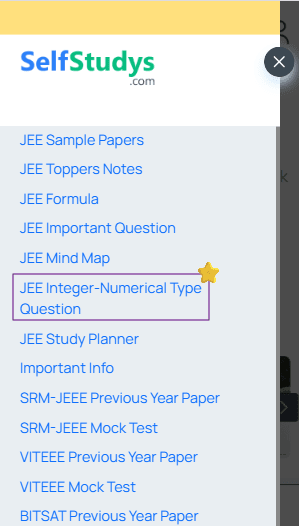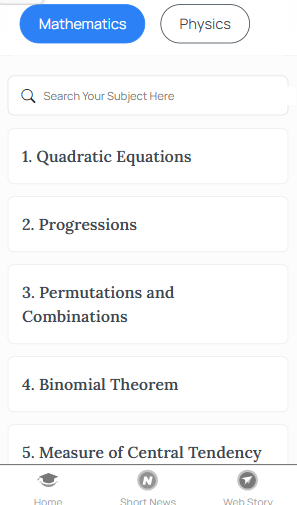- 1. Quadratic Equations
- 2. Progressions
- 3. Permutations and Combinations
- 4. Binomial Theorem
- 5. Measure of Central Tendency
- 6. Complex Numbers
- 7. Probability
- 8. Determinants
- 9. Matrices
- 10. Functions
- 11. Limit
- 12. Continuity & Differentiability
- 13. Differentiation
- 14. Tangent and Normal
- 15. Monotonicity
- 16. Maxima and Minima
- 17. Indefinite Integration
- 18. Definite Integration
- 19. Area Under The Curve
- 20. Differential Equation
- 21. Point
- 22. Straight Line
- 23. Circle
- 24. Parabola
- 25. Ellipse
- 26. Hyperbola
- 27. Vector
- 28. 3D geometry
- 29. Trigonometric Ratio
- 30. Trigonometric Equation
- 31. Inverse Trigonometric Function
- 32. Properties of Triangle
- 33. Height and Distance
JEE Integer Numerical Type Questions
In the Joint Entrance Examination - Mains, there are a total number of 25 questions in each section. These questions are further divided into two parts. One includes 20 multiple-choice questions and the other has 5 JEE integer numerical type questions. It is necessary to attempt all these questions during the exam.
That’s why, the digital platform of SelfStudys provides you with the JEE Mains integer type questions PDF which you can solve online or download for later use free of cost. Our subject-matter experts compile this PDF file on the basis of the questions that have been asked in the past exams as well as those that might appear in the upcoming examination. With the daily practice of these questions, you can understand the pattern of the exam and increase your chances of scoring well.
Latest Joint Entrance Examination - Mains Pattern
For the year 2025, the National Testing Agency has revised the pattern for the Joint Entrance Examination - Mains. In the table below, we have mentioned the JEE Mains integer type questions instructions for the JEE Mains (B.E/ B. Tech).

|
PARTICULARS |
DETAILS |
|
Examination Mode |
Computer-Based Test |
|
Duration of the Examination |
3 hours |
|
Examination Medium |
13 languages
|
|
Number of Sections |
3
|
|
Total Number of JEE Numerical Value Questions |
15
|
|
Total Marks for the JEE Numerical Questions |
60
|
Note: Some important JEE Mains integer type questions rules are given below for your reference.
- For every numerical question, you need to enter the correct integer value for the answer. You can do so by using the mouse and on-screen virtual numeric keypad.
- Your answer should be rounded off to the nearest integer for the JEE integer numerical type questions.
- For each correct answer to these questions, you will get 4 marks and for each incorrect answer, -1 mark will be awarded.
- The unanswered or marked-for-review JEE numerical value questions will provide you with no marks.
- You are advised to make calculations only with the constants that are given (if any) in the JEE numerical questions.
- If by any chance, the question in the exam is found to be incorrect or is dropped, then all the candidates will get 4 marks for it.
Subject-Wise JEE Mains Integer Type Questions PDF
On our platform, you will get the JEE Mains integer type questions PDF in a subject-wise layout. This means there are separate PDF files available for these questions on Maths, Physics, and Chemistry subjects. The main topics on which these questions are mostly based are described in the table below.

|
SUBJECT |
IMPORTANT TOPICS |
|
Maths |
Quadratic Equations; Progressions; Permutations and Combinations; Binomial Theorem; Measure of Central Tendency; Complex Numbers; Probability; Determinants; Matrices; Functions; Limits; Continuity and Differentiability; Differentiation; Tangent and Normal; Monotonicity; Maxima and Minima; Indefinite Integration; Definite Integration; Area Under the Curve; Differential Equation; Point; Straight Line; Circle; Parabola; Elipse; Hyperbola; Vector; 3-D Geometry; Trigonometric Ratio; Trigonometric Equation; Inverse Trigonometric Equation; Properties of a Triangle; Height and Distance. |
|
Physics |
Physical World; Units and Measurements; Motion in a Straight Line; Motion in a Plane; Laws of Motion; Work, Energy, and Power; System of Particles and Rotational Motion; Gravitation; Mechanical Properties of Solids; Mechanical Properties of Fluids; Thermal Properties of Matter; Thermodynamics; Kinetic Theory; Oscillations; Waves; Electric Charges and Fields; Electrostatic Potential and Capacitance; Current Electricity; Moving Charges and Magnetism; Magnetism and Matter; Electromagnetic Induction; Alternating Current; Electromagnetic Waves; Ray Optics and Optical Instruments; Wave Optics; Dual Nature of Radiation and Matter; Atoms; Nuclei; Semiconductor Electronics- Materials, Devices, and Simple Circuits; Communication Systems. |
|
Chemistry |
Alcohol, Phenols, and Ethers; Aldehydes and Ketones; Alkyl and Aryl Halides; Hydrocarbons; Amines; Amino Acids, Carbohydrates; Dyes and Polymers; Gaseous State; Electrophilic Aromatic Substitution; Atomic Structure; Carbonyl Compound; GOC and Isomerism; Surface Chemistry; Carboxylic Acids and Derivatives; Chemical Equilibrium; Chemical Bonding; Chemical Kinetics; Ionic Equilibrium; S-block Elements; Solid State; Qualitative Analysis; Electrochemistry; Stoichiochemistry; P-block Elements; Liquid Solution; Ores and Metallurgy; Thermochemistry and Thermodynamics. |
JEE Numerical Questions With Solutions
The JEE integer numerical type questions are provided along with accurate solutions on our website. You will get step-by-step explanations of each answer included in the PDF file. By referring to these solutions, you can understand the correct way of answering the questions and improve your problem-solving abilities. It is advised that you check out the given solutions after attempting the questions on your own. In this way, you will be able to learn about the areas where you excel or lack. Then, you can work on your weaker areas with focused study sessions.
How To Solve JEE Numerical Value Questions On SelfStudys?
In this section, we have mentioned the JEE Mains integer type questions instructions to access the PDF and solve the given problems. You just need to have a stable internet connection in order to complete the process successfully.
- You may open a web browser of your choice on the device and type www.selfstudys.com in the search space.

- Once you reach our website, you should click on the ‘Navigation’ tab. It will be visible on the top left-hand side of the screen.
- After this, you can explore the main categories of our platform and select the ‘JEE’ section.

- This section will further expand with a drop-down menu wherein you need to scroll down and select the ‘JEE integer numerical type questions’ option.

- Within a short interval, a new web page will load up on your screen. Here, you can go through the subjects for which we provide JEE Mains integer type questions rules.

- You can choose the subject and click on its name to open the variety of chapters for JEE Mains integer type questions PDF.
- You are permitted to select any chapter related to the JEE numerical value questions according to your preferences.
- At last, the PDF file of the JEE numerical questions will be visible on your screen. You can either download it or continue to solve the questions online.
Note: For the downloading of the JEE Mains integer type questions instructions PDF, it is important that you Log In or Sign Up with your Gmail ID on SelfStudys.
The Role Of JEE Integer Numerical Type Questions In Test Strategy
The JEE integer numerical type questions play a very important role in the exam. Through these questions, whether you can apply concepts accurately and quickly without any options is tested. Some points regarding the role of solving these questions while preparing for the exam are discussed below.
- In the JEE Mains integer type questions instructions, it is said that you need to think quickly and do precise calculations. As these questions do not have any answer options on which you can rely, you need to develop good problem-solving skills. Solving these problems during study sessions will help you notice key information to frame your answer. Ultimately, you will be able to improve your performance on these questions in each section of the exam.
- Everyone is aware that managing time during the Joint Entrance Examination is very crucial and these questions can impact how you do time management significantly. Once you get familiar with the JEE Mains integer type questions rules and patterns, you can solve them quite faster. With the practice of these problems, you can also enhance your assessing abilities and reduce any calculation errors. Then, you can allocate proper time to every question and section while taking the exam.
- Through this question type, how well you understand the concepts and apply them directly is checked as well. While solving these questions, you are pushed to focus deeply and be accurate. The addition of JEE Mains integer type questions PDF in your study sessions solidifies your analytical skills. Moreover, you can improve your accuracy in solving difficult questions and boost your confidence.
- By exercising the JEE numerical questions, you can understand their format as well as style. This will help you to approach these questions during the real exam with more confidence. You can also avoid any surprises on the exam day with regular practice of the questions.
Tips And Strategies For Solving JEE Mains Integer Type Questions PDF
If you wish to solve the JEE numerical value questions correctly, then you should follow the tips that are given below one by one.
- Before you start to attempt a solution, you must take some time to read the JEE integer numerical type questions carefully and check for the underlying concept that is being tested. By doing so, you can learn the correct approach to solving the questions.
- In the JEE Mains integer type questions PDF, you may have to take multiple steps or divide the information into smaller parts. One great strategy for solving these questions is to tackle them step-by-step and complete one segment before moving to the next. In this way, you will be able to avoid any careless errors for sure.
- Once you have understood the problem, you should notice which formula or principle will work the best. Then, you should apply it accurately in the JEE numerical questions. You must avoid going to the conclusions directly and make sure that each term is mentioned properly.
- After solving the JEE numerical value questions, it is very important to double-check your responses. Be aware that in these questions, your answer has to be a clear integer. With this process, you can ensure that the final result is related to the question and makes sense.
- In order to enhance your accuracy in the JEE integer numerical type questions, our subject-matter experts recommend you solve them as many times as you can during preparation. For this, you can also attempt various mock tests and PYPs with a timer.
Best Books To Study For Solving JEE Mains Numerical Questions
The table mentioned below provides you with a list of books that you can study to master the JEE Mains integer type questions rules before the exam.
|
SUBJECT |
BOOK NAMES |
|
Physics |
|
|
Chemistry |
|
|
Maths |
|







 Profile
Profile Signout
Signout










 Quiz
Quiz
 Get latest Exam Updates
Get latest Exam Updates 










